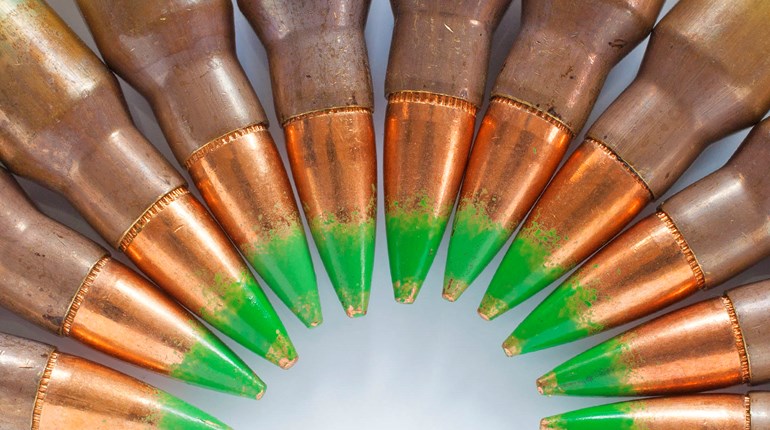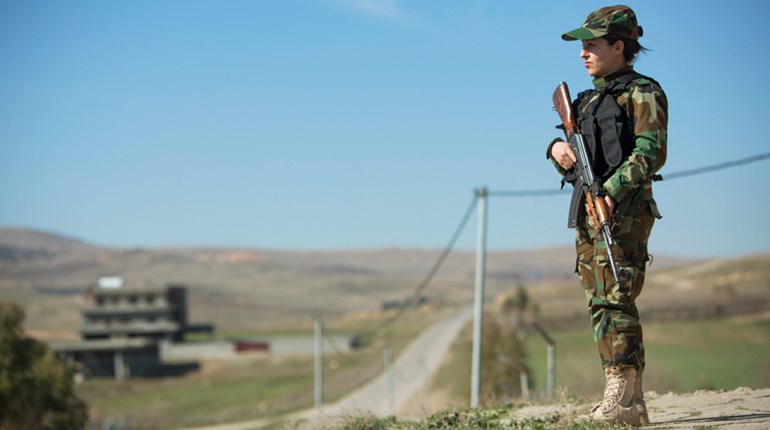
Think ISIS is a threat to America? Be glad they don’t own Canada. When the world’s largest, best-funded terror group moves in next door, the neighborhood gets decidedly less neighborly.

Just ask the Kurds.
Refresher on Kurdistan—the semi-autonomous region of northern Iraq that is home to 6 million ethnic Kurds. They’re a fiercely independent people descended from the Medes of Persia, and known for their hospitality and tolerance. They are incredibly religiously diverse. There are Kurdish Christians, Muslims, Zoroastrians and Yazidis, yet they all somehow manage to live in the same area without killing each other—a minor miracle in this part of the world.
Or, at least, it was. In mid-2014, ISIS kicked off a “northern offensive” out of Syria and tried to take over Kurdistan, murdering thousands of Kurds in the process and displacing more than 1.5 million. They would have likely succeeded in capturing the region if it weren’t for the Peshmerga—the legendary ad-hoc Kurdish army.
Without much in the way of centralized control, outside help or modern weapons, the Peshmerga fought ISIS to a standstill on the banks of the Tigris River, but not before ISIS took a sizable chunk of their land.
The Peshmerga will continue to fight where they can, but ISIS will not be pushed out until the Iraqi army gets its act together and makes a serious effort from the south.The Kurds have been begging for assistance for more than a year. Currently, they are fighting ISIS—and winning—with whatever arms they can scrape together. Some are American weapons, but they didn’t get them from us. They captured them from ISIS.
The tagline of our show, “Frontlines,” is “From the Frontlines of Freedom.” Right now, one place to find that is where the Kurds are holding off not just a threat to their region, but a threat to civilization as we know it. So we decided to pay them a visit.
Getting to Iraq is easier than it used to be. During the war, we had to fly to Kuwait, meet up with U.S. forces, and fly from there into Baghdad on a military transport plane. No more. Nowadays, it’s an easy hop through Vienna on a plane filled with businessmen and contractors.
Erbil, the capital of Kurdistan, has been in a slump since last year, when the price of oil tanked. But it’s still bustling, more modern and safer than many U.S. metropolitan cities. I’d rather take my kids to Erbil than to Baltimore, for sure.
Traveling with Oliver North has its perks. A security team picked us up at customs and whisked us out to a waiting three-vehicle convoy of armored Toyota Landcruisers. After a night in a private villa in Erbil belonging to a friend of LtCol North, our security team met us the next morning and we headed for Dohuk, a city of about 350,000 in an area still held by the Kurds. There, we met with Peshmerga commanders who would give us a tour of the front lines.
Leaving Dohuk, it was time to break out the body armor. Infrequent IED strikes become more common as you approach the front lines, so it was best not to take any chances. If there’s one thing I’ve learned as a war correspondent, it’s that it pays to be cautious if you don’t want to become a statistic.
The front line with ISIS was, for the moment, quite well defined, with WWI-style trenches, bunkers and outposts spread along a 300-kilometer front from the Syrian border to the outskirts of Mosul and south toward Baghdad. As a terror group goes, ISIS is unique in that it actually holds territory: Usually terrorists try to blend in with the populace. In a way, this is quite helpful—the demarcation between friendly and enemy territory makes it easier to figure out where to shoot.
The Peshmerga soldiers were eager to show off their weapons—Soviet AK-47s and an ancient Russian T-55 tank. They decided to test-fire the 12.7 mm DShK machine guns for us, but that didn’t go so well. The guns jammed repeatedly, and nobody bothered with hearing or eye protection. With ears ringing, we headed toward a different section of the front closer to Syria.
Warfare is 90 percent crushing boredom and 10 percent sheer terror. The Peshmerga on the line have this figured out. They pass their days like millennia of soldiers before them: They stand guard, they sleep, they maintain their equipment, they smoke. Mealtime is the highlight of the day. Our supper the first night was an unfortunate goat that was roasted over a campfire and served with the ubiquitous naan flatbread and rice.Warfare is 90 percent crushing boredom and 10 percent sheer terror. The Peshmerga on the line have this figured out.
We stayed up late chatting with our hosts about life in the Peshmerga army, solving the problems of the world as soldiers are wont to do. The temperature dropped steadily, and before midnight we bundled off to our sleeping quarters—a bunker in the center of the camp.
The dirt floor had been covered by two layers of carpets. I managed to scrounge up a thin mat that our cameraman Dennis and I spread out sideways to share so at least our torsos would be off the ground. Our thin sleep sacks seemed like a good idea when we were packing, but now as the temperature dipped into the 40s outside, it looked like we were in for a miserable night. As soon as the lights went out, one of our guards was bitten on the finger by a rat and decided discretion was the better part of valor. He packed up and went to sleep in the truck.
But it had been a long day, and I actually slept better than I expected. With jet lag however, I was wide awake by 4 a.m., so went out to sit by the smoldering campfire and try to coax some warmth from it. The Peshmerga captain who was our guide soon joined me, and while neither of us spoke a common language, we enjoyed showing each other photos of our families and homes on our smartphones.
Breakfast was leftovers from supper. There was tea and instant coffee, which helped immensely. Dennis showed up, and we discussed the shooting we’d need to do that day. One challenge traveling with LtCol North is that everyone wants to meet him, so it’s easy to spend the entire day glad-handing and getting “briefings.” But death by PowerPoint doesn’t make good television, so we discussed how we’d divide and conquer to get the shots we needed.
For the rest of the week we toured the entire length of the front—coming to within meters of the Syrian border, visiting half a dozen villages that were literal ghost towns after ISIS had massacred or driven off everyone in them, and seeing the destruction the terrorists had wreaked across the landscape. We peered down at ISIS positions in Sinjar, narrowly avoiding incoming mortars in the process. We visited multiple refugee camps for Syrians and displaced Yazidis, and heard their stories. We watched airstrikes take out ISIS positions and cheered. We slept somewhere new every night—sometimes on the ground, sometimes in a bed. But living hard is a small price to pay for the privilege of seeing history in the making and spending time with warriors who are actively engaged in the fight against evil.
A few days after we left the front, the Peshmerga forces pushed ISIS out of Sinjar and cut the supply line feeding ISIS in Mosul. It was an important first step in pushing the Islamic State out of Iraq altogether. The Kurds did it with very little help from the United States and almost no support from their own government in Baghdad. The Iraqi army is reluctant to send weapons to the Kurds since they might someday be used to secure an independent Kurdish state.
As of this writing, ISIS still holds a vast swath of Iraq, including Ramadi and Mosul, its second largest city. The Peshmerga will continue to fight where they can, but ISIS will not be pushed out until the Iraqi army gets its act together and makes a serious effort from the south. Until then, the brave men we met will continue to take their place on the wall to guard the front lines of freedom. I hope we can continue to be there to document it.To see more of Chuck and the team’s adventures in Iraq documenting the Pershmerga’s fight, watch “America’s Forgotten Ally Against ISIS,” an exclusive episode of Frontlines—here!


































